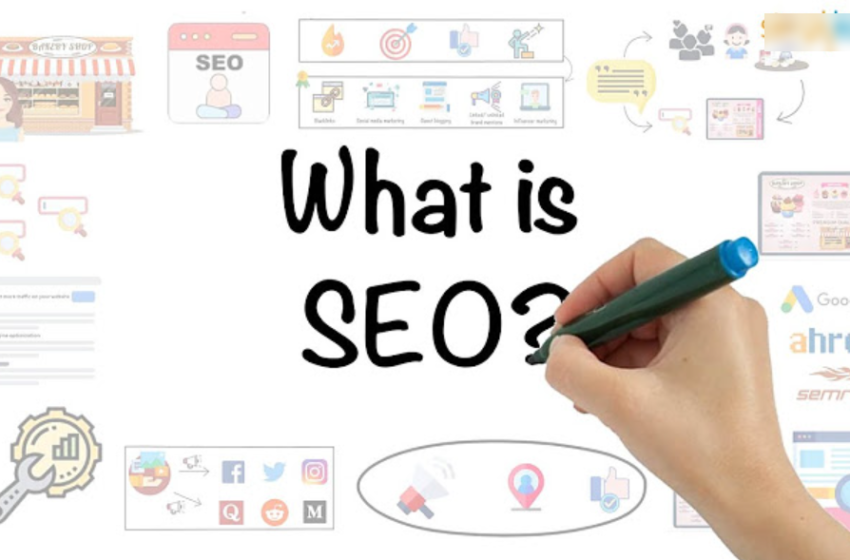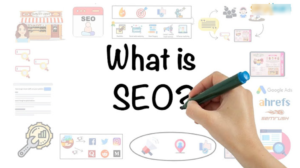What is SEO?

What is SEO?
What is SEO?
Search engine optimization (SEO) is the process of improving your website so that it ranks higher in search engines.
- It’s important to understand what SEO is, what its purpose is and how it works.
- You also need to know about the history of SEO so you can understand where we are today and where we’re going in the future.
The Benefits of SEO
SEO is a process that helps you increase your website’s visibility, improve user experience and generate leads and sales.
The benefits of SEO are numerous:
- Increased website traffic – Search engine optimization helps you attract more visitors to your site by improving its ranking in search results. This means that when people search for something related to what you offer, they will see your business at the top of their list of results instead of someone else’s. In other words, SEO can help you stand out from the crowd!
SEO Best Practices
SEO best practices include:
- Optimizing content for search engines. This involves using keywords and phrases that are relevant to your business, as well as developing link-building strategies.
- Utilizing social media platforms like Facebook, Twitter and Instagram to promote your brand or products/services.
- SEO Strategies for Different Industries
When it comes to SEO, there are many different strategies that can be used in order to achieve your goals. In this section, we’ll explore the most effective ways of optimizing your website for different industries.
- E-commerce: If you have an e-commerce business and want to improve your rankings on search engines like Google and Bing, then this guide will show you how.
- Local businesses: If you’re a local business owner who wants more customers in their area (and not just across the country), then this guide will help with that as well!
- B2B companies: Lastly, if you own or work at a B2B company (businesses that sell products or services directly from other businesses) then this section is perfect for learning about how these types of companies can use SEO tactics to grow their online presence!
SEO for Mobile
In this section, we’ll explore how to optimize for mobile search.
- Optimizing for mobile search: It’s important to have a mobile-friendly website so that your content can be found by users on their phones and tablets. If your site isn’t optimized for mobile devices, Google may not rank your pages as highly in its results.
- Creating mobile-friendly content: When creating content for the web, it’s best to make sure it will work well on all screens–not just desktop computers but also smartphones and tablets too! You can do this by using responsive design techniques so the same URL serves up different versions of itself depending on what device someone is using (e.g., https://www.examplewebsite/page1). This way you only need one version of each page rather than having separate URLs for each type of device (elements within those pages might still need some tweaking though).
SEO Tools and Software
When it comes to SEO, there are a lot of tools out there that can help you get the job done. Some of these tools are free and some require a monthly or annual subscription fee. Here are some popular options:
- Analyzing competitors’ SEO strategies
- Keyword research
- Website audits (e.g., Moz’s Open Site Explorer)
Measuring SEO Success
Once you’ve identified your goals, it’s time to start measuring your success. This is where things get a little tricky.
There are many ways of measuring SEO success, but there’s no single metric that will tell you everything you need to know about how well your site is performing. Instead, we recommend looking at three different metrics: website traffic and conversions; user behaviour on the site; and other data points that can help identify trends in how people are interacting with content across various platforms (social media, email newsletters).

The Future of SEO
As you can see, the future of SEO is bright. However, there are some things to keep in mind as we move forward.
- Voice search will become more common and more important as time goes on. If you don’t have a voice-optimized website or app, now is the time to start working on it!
- AI powered SEO will also become more important as time goes on–and if you’re not familiar with this concept yet, now is also an excellent time for getting acquainted with it!
Tips for Hiring an SEO Professional
When you’re ready to hire an SEO professional, there are a few things you can do to ensure that the person you choose is qualified and trustworthy. Here are some tips:
- Check references. You should always check references before hiring anyone–and this is especially true for SEO professionals. Ask for at least three references from other clients (or past employers) who have worked with the potential candidate in similar capacities as yours. If they don’t have any such clients or employers, then it may be time to look elsewhere!
- Understand what they’ll do for your business and its goals before signing on the dotted line. This can help avoid any confusion later down the line when things aren’t going exactly as expected–or worse yet, if they aren’t going at all! It also helps set realistic expectations so both parties understand what each side expects from each other during this process; if there’s no clear understanding between these two parties early on then problems will arise later on down road when one party feels like something isn’t being done right or fast enough by another party involved in project/job completion process.”
Conclusion
In conclusion, SEO is a complex and ever-changing field. It’s important for marketers to stay on top of the latest trends and techniques in order to achieve their goals.
If you’re looking for more information about SEO, here are some resources that may be helpful:
- SEO Blog – A great place to start if you want an overview of all aspects of search engine optimization.
- Google Search Console – Google’s toolkit for webmasters offers insights into how your site is performing in search results, along with recommendations on how you can improve its performance over time (and avoid penalties).
3 Comments
[…] These LSI keywords example are closely related to the main keyword “healthy recipes” and can be used to provide additional context, expand the content, and improve search engine optimization. […]
[…] What is SEO? […]
This was both informative and hilarious! For further reading, check out: LEARN MORE. Any thoughts?